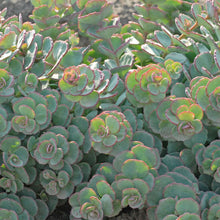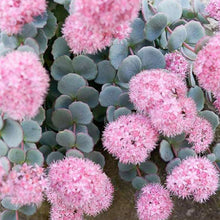Sedum sieboldii is a graceful low growing stonecrop known for its cascading, round blue green leaves edged in pink. In fall, the foliage intensifies to rose and red tones, topped by clusters of soft pink star shaped flowers.
Height & Spread: 4 - 6 in x 12 - 18 in
Bloom Time: Late summer to fall
Light Requirements: Full sun to part sun
Soil Preference: Well drained, sandy or rocky soil
Watering Needs: Low; drought tolerant once established
Deer Resistance: Seldom bothered by deer due to succulent leaves
Native Status
This species is native to Japan. Though not native to North America, it is well adapted to a variety of temperate garden conditions and commonly used in ornamental settings.
WILDLIFE & INSECTS
Butterflies
- Provides late season nectar for Painted Ladies and other fall flying butterflies.
Bees
- Attracts native bumblebees and honeybees during its late bloom window.
Hummingbirds
- Rarely visited, but its soft color and shape may add visual interest in hummingbird friendly gardens.
Spacing & Landscape Use
Spacing Recommendations
- Space plants 12 - 18 in apart to allow for spreading growth and natural draping over edges or rocks.
Landscape Placement
- Ideal for rock gardens, troughs, containers, and borders where its trailing form can soften hard edges or spill attractively. Also excellent for roof gardens or dry slopes.
Companion Plants
- Thymus praecox (Creeping Thyme) - Shares similar low growing, sun loving characteristics and complements the pink flowers of Sedum.
- Erigeron karvinskianus (Santa Barbara Daisy) - Offers fine texture and continuous bloom, echoing Sedum’s soft color palette.
- Delosperma cooperi (Ice Plant) - Adds vivid magenta blooms and succulent foliage to match Sedum’s drought tolerance.
- Festuca glauca (Blue Fescue) - Provides cool blue grass texture that enhances the foliage tones of Sedum sieboldii.
- Campanula portenschlagiana (Dalmatian Bellflower) - Offers low growing purple flowers that create contrast and extend the bloom season.



